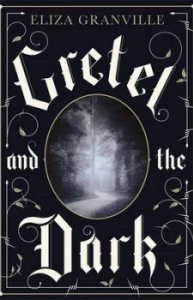
A dark, distinctive and addictively compelling novel set in fin-de-siecle Vienna and Nazi Germany - with a dizzying final twist
Vienna, 1899. Josef Breuer - celebrated psychoanalyst - is about to encounter his strangest case yet. Found by the lunatic asylum, thin, head shaved, she claims to have no name, no feelings - to be, in fact, not even human. Intrigued, Breuer determines to fathom the roots of her disturbance.
Years later, in Germany, we meet Krysta. Krysta's Papa is busy working in the infirmary with the 'animal people', so little Krysta plays alone, lost in the stories of Hansel and Gretel, the Pied Piper, and more. And when everything changes and the world around her becomes as frightening as any fairy tale, Krysta finds her imagination holds powers beyond what she could have ever guessed...
Eliza Granville was born in Worcestershire and currently lives in Bath. She has had a life-long fascination with the enduring quality of fairytales and their symbolism, and the idea for Gretel and the Dark was sparked when she became interested in the emphasis placed on these stories during the Third Reich.
Gretel and the Dark taster
It is many years before the Pied Piper comes back for the other children. Though his music has been silenced, still thousands are forced to follow him, young, old, large, small, everyone... even the ogres wearing ten-league boots and cracking whips, even their nine-headed dogs. We are the rats in exodus now and the Earth shrinks from the touch of our feet. Spring leaves a bitter taste. All day, rain and people fall; all night, nixies wail from the lakes. The blood-coloured bear sniffs at our heels. I keep my eyes on the road, counting white pebbles, fearful of where this last gingerbread trail is leading us.
Has the spell worked? I think so: coils of mist lap at our ankles, rising to mute all sounds, swallowing everyone around us whole. When the moment comes, we run blind, dragging the Shadow behind us, stopping only when my outstretched hand meets the rough bark of pine trunks. One step, two, and we’re inside the enchanted forest, the air threaded with icy witch-breaths.
The day collapses around us. Phantom sentries swoop from the trees demanding names but our teeth guard the answers so they turn away, flapping eastward in search of the cloud-shrouded moon. Roots coil, binding us to the forest floor. We crouch in a silence punctuated by the distant clatter of stags shedding their antlers.
We wake, uneaten. Every trace of mist has been sucked away by the sun. The landscape seems empty. We haven’t come far: I can see where the road runs but there’s no sign of anything moving along it. It’s quiet until a cuckoo calls from deep within the trees.
To read the full extract click here.
A Q&A with Eliza Granville
What was the original inspiration for Gretel and the Dark?
Quite out of the blue, my imagination served up an image of a displaced and naked young girl. I can’t explain this - and am not sure I want to. This is the third piece of writing such a girl has sparked (the others are a novella, Snatchling, and a short story). This particular version had a barcode on her arm. I intended to use it for a work of science fiction. However, when I substituted the tattoo, everything else fell into place.
How did you set about researching your novel? Have you ever visited any of the places referenced in the novel and how did this affect the writing process?
I first visited Vienna and parts of Germany in the 1960s and early 1970s. The mood then was very different to that of the 21st century and I suspect very different to 1899 and the 1940s. Much of the work on Vienna had to be done through research of old maps. Some of the research on the Nazi era was very gruelling.
How did you come to be interested in Grimms’ Fairy Tales and in what context did you begin researching them?
I have always been interested in all fairy tales, and in folk lore. My interest deepened when I realised that each of my children had a favourite tale - which they insisted on hearing repeatedly - and that in many cases the story revealed something of their concerns or preoccupations. The beginnings of serious research into fairy tales (not exclusively those of the Grimm brothers) began when I was an undergraduate at Dartington College.
How did the interpretation of Grimms’ fairy tales and their role in German culture change between the Grimm brothers’ lifetime and the years of the Third Reich?
I believe that emphasis was increasingly laid on traits such as stringent discipline, obedience, authoritarianism, violence and cruelty, things that already existed in the stories but were, in situ, partially tempered by other factors. The German writer Günther Birkenfeld considered that anyone examining the tales would understand how the German people were able to bring themselves to perpetrate the atrocities of the camps. The Allied commanders banned the book in schools after the war, arguing that they had found the roots of Nazism in the Grimms' world.
What was the attitude towards these fairy tales in other European countries like France and England, in the 19th century and at the end of the Second World War? A very interesting question. One that I can’t answer. I do know that the Victorians almost wiped out the English fairytale, substituting ‘improving’ Sunday school type stories. The fairytale form was used in order to direct propaganda at children during the Vichy administration in France.
To read the full interview click here.






